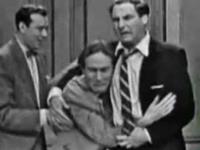Sid Caesar, who died Wednesday at age 91, was the driving engine behind NBC’s original “Saturday night live’’ – a show that has as great an impact on popular culture as the current SNL…
That series was Your Show of Shows, which ran on NBC from 1950-1954. It was broadcast in prime time, but other than that, everything about it sported the same template as Saturday Night Live, which would appear a TV generation later. Your Show of Shows, like the much later SNL, was 90 minutes long. It featured a guest host each week, and musical guests. And it was driven by a brilliant staff of performers and writers, the former led by Sid Caesar, with very able assistance from Imogene Coca, Carl Reiner and Howard Morris.
That wasn’t Caesar’s only TV showcase series from the early days of television. Your Show of Shows had grown out of Admiral Broadway Revue the year before, which had been simulcast by NBC and DuMont the year before that. And after the talent on Your Show of Shows opted to divide and conquer, Caesar went on to Caesar’s Hour, maintaining some of the Your Show of Show writers, and adding others – including Larry Gelbart and Woody Allen, just to name two.
And if you want to name the writers on Your Show of Shows, you can start with Caesar, Reiner, Mel Brooks, Neil Simon, Danny Simon, Lucille Kallen, Max Liebman, and Mel Tolkin. Follow the resumes of all those writers, and you’ve got a legacy of 20th-century comedy every bit as impressive as that to spring from SNL or The Daily Show with Jon Stewart.
 I teach Your Show of Shows in my TV History & Appreciation classes at New Jersey’s Rowan University – and every term, the comedy brilliance and antic energy of This Is Your Story (an extended spoof of the ambush biography show This Is Your Life) and the mostly wordless segment “The Clock” work as well as they must have in the early Fifties.
I teach Your Show of Shows in my TV History & Appreciation classes at New Jersey’s Rowan University – and every term, the comedy brilliance and antic energy of This Is Your Story (an extended spoof of the ambush biography show This Is Your Life) and the mostly wordless segment “The Clock” work as well as they must have in the early Fifties.
In 2001, Sid Caesar appeared during the Television Critics Association press tour to accept a Lifetime Achievement Award. He was in his late 70s then, and looked frail as he waited his turn to take his tentative tiny steps to the podium. As soon as he started to talk, though, the showman in him shaved decades off his demeanor.
Instead of delivering the expected thank-you speech, Caesar launched into one of his patented nonsense-language riffs. The usually hard-to-please crowd of TCA TV critics howled with laughter, because we were not only familiar with, but weaned on, Caesar’s gift for gobbledygook. He finished doing his “speech,” in what sounded like almost passable German, to a loud ovation. Then he picked another language to skewer, and did it again. And again.
Then, after his real thank-you speech, Caesar received a standing ovation so long that he was able to negotiate his way down the steps from the stage and towards his front-row table – at which point, still relishing the spotlight, he mimed remembering one more thing, and worked his way back to the stage and the podium, just as slowly.
The laughter, and the applause, stayed with him all the way. It was a grand bit of live comedy, from a guy who first provided them more than 50 years earlier.
That same year, I interviewed Caesar about his guest appearance on ABC’s Whose Line Is It Anyway?, an ABC improv series appearance perfectly suited to Caesar’s comedy skills – and taped, as it turned out, on his 79th birthday. I asked if he had been nervous, taking the stage in front of a live studio audience after so many years away.
“The nervousness I have now,” he said, “is, ‘Will they remember me? Will they know who I am?’”
Caesar said he told Carey, before the taping began, “These kids don’t know me. Two generations now, they never heard of me. Maybe their fathers, probably their grandfathers.”
Caesar then picked up the story of what happened next.
“Then when I get out there,” he told me, both astonished and proud, “I walk out onstage and get a 15-minute standing ovation. Really – I was so shocked. It was so nice. I looked around and said, ‘Who came in?’
“That really got me.”
That story really got me, too. There aren’t many TV icons from the salad days of television that were as original as Sid Caesar, as influential, or as monumentally talented. He was smart enough to surround himself with the best, on stage and off, and push them all, and himself, to do things on television that had never been done before, and seldom have been done as well since.
Sid Caesar will be missed.
He will not, however, be replaced.